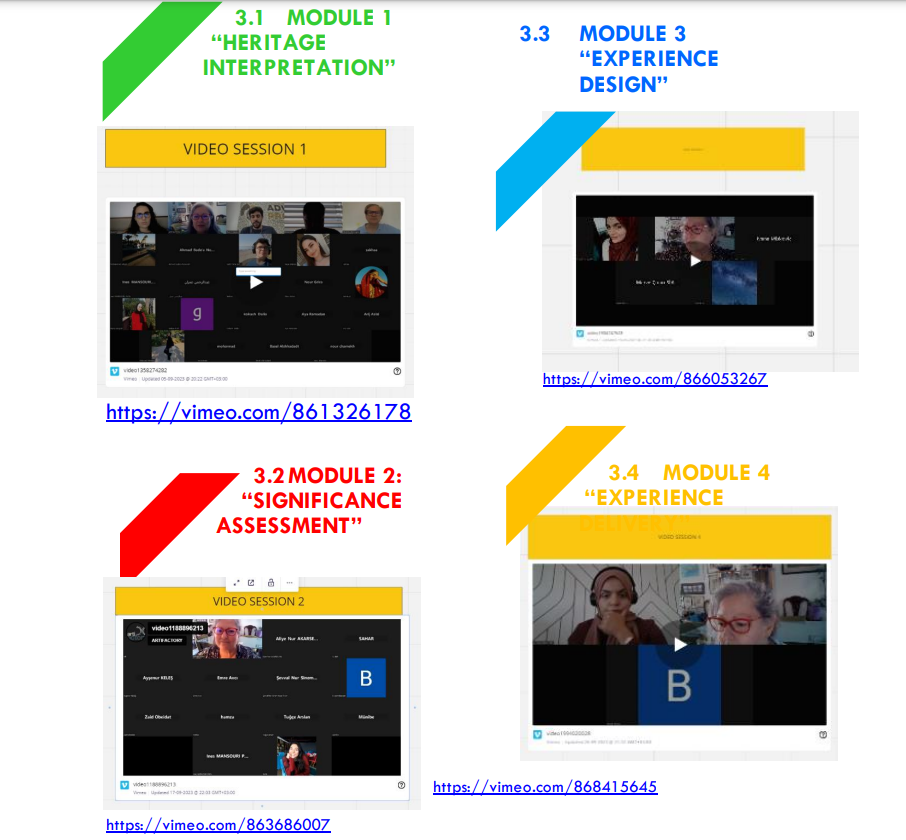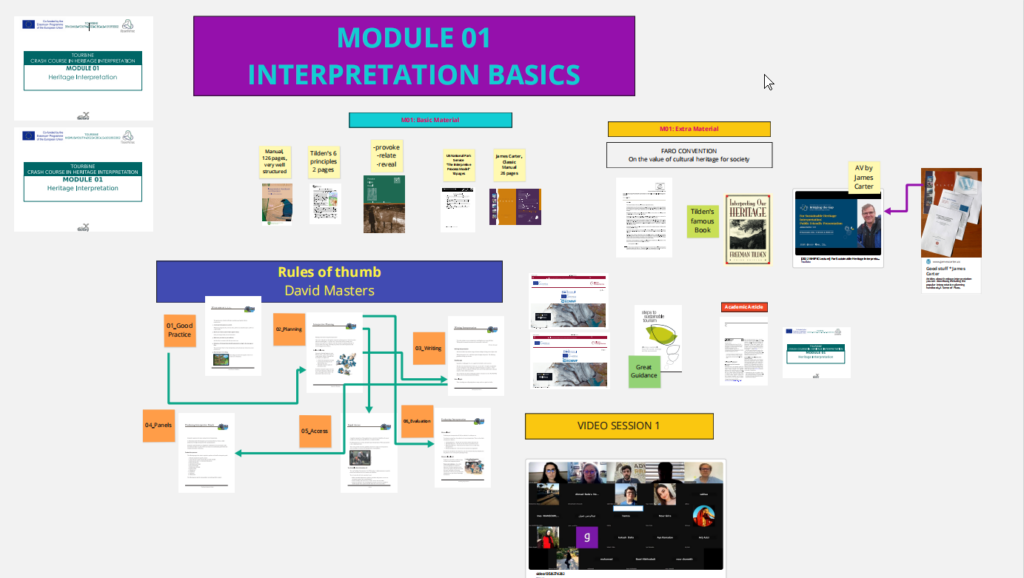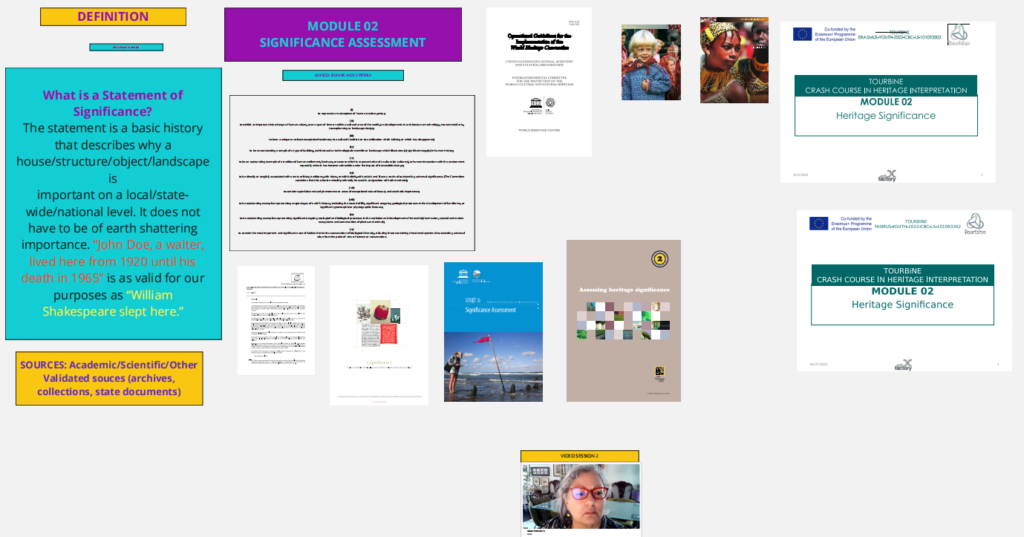Crash Course in Heritage Interpretation
The TOURBiNE project focuses on supporting young people with fewer opportunities (NEET) in developing entrepreneurial mindsets and digital skills for self-employment through community-based tourism. The project aims to diversify tourism offerings in peripheral destinations with heritage-based products and services. TOURBiNE stands for “Diversifying tourism offers in peripheral destinations with heritage-based products and services, stakeholder skills alliances to internationalize locally operating micro-enterprises.”

- Objectives:
- Support young people with fewer opportunities (NEET).
- Develop entrepreneurial mindsets and transversal key competences.
- Enhance digital skills to secure self-employment.
- Cross-Border Partnership:
- Involves organizations from Turkey, Holland, Greece, Bosnia Herzegovina, Jordan, Tunisia, and Egypt.
- Partners include entities focusing on education, agility, youth innovation, and local initiative support.
- Overall Emphasis:
- The primary emphasis is on empowering NEET individuals through the development of skills and competences for self-employment in the field of community-based tourism with a focus on heritage-based products and services.
MODULE 01
Heritage Interpretation


Subject Matter:
- Heritage interpretation involves communication to help people understand, appreciate, and respect heritage.
Needs:
- Emphasizes the importance of interpretation for understanding, caring, predicting, and avoiding losses in the context of finite resources.
Definitions:
- Interpretation is defined as a process of communication to convey heritage understanding, appreciation, and respect.
Supply-Demand Issues:
- Discusses the accessibility and benefits of heritage interpretation, considering direct and indirect values.
Techniques:
- Describes various techniques for heritage interpretation, including themes, objectives, and means such as multimedia, publications, walks, talks, and more.
MODULE 02
Heritage Significance


- Man-Nature Interaction:
- Cultural landscapes and manmade cultural heritage.
- Exploration of oral and written languages, spiritual cultural heritage, objects, collections, customs, traditions, built environment, rites, beliefs, and oral histories.
- Heritage Classes:
- Classification into Natural Heritage, Built/Man-made Environment, Material Cultural Heritage, and Intangible Cultural Heritage.
- Natural Heritage Assets:
- Detailed exploration of natural heritage assets, including physical descriptions, expertise, legal protection frameworks, and scientific fields like geomorphology, geology, paleontology, pedology, speleology, hydrology, and more.
- Heritage Site Designation:
- Importance of sites designated at international, national, regional/local levels.
- Mention of Special Protection Places (SPAs), Ramsar Sites, Special Places of Conservation (SACs), National Nature Reserves, and sites of regional/local importance.
- Heritage Resources for Tourism:
- Various natural heritage attractions for tourism, including countryside parks, national parks, town parks, forestry, farms, botanical gardens, cemeteries, wildlife parks, zoos, and more.
- Educational and Recreational Uses:
- Highlighting the diverse uses of natural heritage attractions, such as recreation, learning, entertainment, outdoor, and indoor activities.
- Importance of Heritage Significance:
- Emphasis on the significance of heritage interpretation for tourism planning, considering land uses and contributions to the field of geography.


TOURBINE Multilevel Actors workshop/Survey report
The future of the tourism industry will be shaped by the demand for entrepreneurial skills, with a focus on innovation, agility, social and environmental responsibility, collaboration, and digital literacy. Key customer segments include Millennials, Generation Z, adventure seekers, eco-conscious tourists, and experience seekers. High-demand skills in the tourism sector encompass digital marketing, data analysis, customer relationship management (CRM), artificial intelligence (AI), and sustainability management.
- Anticipated Changes in Entrepreneurial Skills:
- Emphasis on entrepreneurial skills fostering innovation and creativity.
- Importance of agility and adaptability in the rapidly evolving tourism industry.
- Growing focus on social and environmental responsibility.
- Key Entrepreneurial Skills:
- Collaboration and networking skills for building relationships and fostering innovation.
- High demand for digital literacy and technological proficiency.
- Cultural competence and cross-cultural communication as tourism globalizes.
- Customer-Centric Approach:
- Prioritizing customer satisfaction, anticipating needs, and building long-term relationships.
- Future Clients in the Tourism Sector:
- Millennials and Generation Z as significant customer segments.
- Growing demand for adventure tourism and sustainable, eco-friendly experiences.
- Rise of experience seekers looking for unique, personalized travel experiences.
- Skills in High Demand:
- Digital marketing proficiency for effective customer engagement.
- Data analysis skills for understanding customer preferences.
- Importance of CRM for building and maintaining strong customer relationships.
- Integration of AI technologies for enhanced customer experiences.
- Sustainability management skills for eco-tourism.
- Essential Digital Skills:
- Website creation and optimization for showcasing destinations and services.
- SEO skills to improve visibility in search engine results.
- Proficiency in social media marketing for brand promotion.
- Utilization of online reservation systems for seamless booking processes.
- Digital Skills Currently Lacking:
- Insufficient expertise in data analytics for gaining customer insights.
- Limited knowledge and implementation of AI and machine learning technologies.
- Training and Education Opportunities:
- Focus on improving communication skills within teams and with customers.
- Training programs for digital literacy, online marketing, social media management, and website development.
- Emphasis on customer service skills and relationship management.
- Collaboration and teamwork training for effective team dynamics.
- Cultural sensitivity and cross-cultural communication training for catering to diverse travelers.
- Conclusion:
- The JYIF survey underscores the importance of digital marketing, data analysis, CRM, AI, and sustainability management skills for the future of the tourism industry.
- Essential digital skills such as website creation, social media marketing, and online reservation systems should be prioritized.
- Organizations need to address existing gaps in areas like data analytics and AI to enhance customer experiences and contribute to sustainable growth.
Erasmus + Capacity Building in the Field of Youth Programme
Multilevel Actors Workshop

Multilevel Actors Workshop- Workshop Documents: B&H multilevel actors


